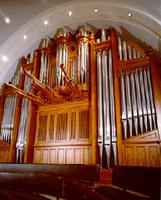
Casavant Frères
Casavant Frères is the most important and illustrious organ-building firm in Canada. It was founded in St-Hyacinthe, Qué, in 1879 by the brothers Joseph-Claver (b 1855, d 1933) and Samuel-Marie (b 1859, d 1929) Casavant. Their father, Joseph Casavant (b 1807, d 1874), was originally a blacksmith who had given up his business to pursue classical studies. He happened upon a 19th century treatise on organ building, which he subsequently used to restore an instrument for l'Abbè Ducharme. Joseph received his first contract in 1840, and by the time he retired in 1866 he had built 17 organs, including the ones for the Catholic cathedrals of Ottawa (then Bytown) and Kingston. Unfortunately, there are no extant instruments bearing his signature.
The Sons
Joseph's sons learned their trade from Joseph Brodeur and Louis Mitchell after their father's retirement in 1866. In 1878 Claver was an apprentice in France and both brothers subsequently travelled in Europe, examining organs and workshops. The next year marked their return to Canada and the establishment of what was to become the country's greatest organ-building enterprise - in the same location where their father had installed his modest workshop 30 years earlier, and where Casavant organs are still being manufactured.
![]()
The brothers installed their first instrument in 1880, in the Notre-Dame-de-Lourdes chapel in Montréal. With the collaboration of the inventor Saluste Duval, they made significant progress in the use and reliability of electricity in organ building. In 1891, in Notre-Dame Cathedral in Montréal, they completed a large organ of 82 stops in which they used electropneumatic action for the stop action and an adjustable combination system. One year later, in the basilica organ in Ottawa, the electropneumatic system was used with success for both the key and stop action, a first in the history of organ building. The instrument in St Patrick's Church in Montréal (1895) was completely electropneumatic.
Casavant Organs
Casavant organs were from the first very highly regarded in Canada and abroad. By 1930, when the Casavant brothers were awarded a Grand Prix at the International Exhibition in Antwerp, more than 1350 instruments had been installed. While sales to that point had been limited mainly to Canada and the US, Casavant organs were soon being built in Europe and South America, and as far away as Africa and Japan. Several famous organists expressed their appreciation of Casavant instruments, including Alexandre Guilmant, Louis Vierne, Charles-Marie Widor, Joseph Bonnet and Marcel Dupré, to name just a few.
Domination of North American Market
During the Depression the firm went through some difficult times, but it rebounded after WWII, reaching a high point during the 1950s with the arrival of the metallurgical engineer Charles Perrault, who in 1961 helped to re-establish the building of mechanical action organs. By 1996 the firm had delivered more than 3750 instruments (including some 350 with mechanical action) and continued to dominate the North American market, without neglecting its exports throughout the world. Claver served as the first president from 1879 to 1933. He was followed by Samuel's son Aristide (1933-380, Fred N. Oliver (Samuel's son-in-law) (1939-59), Jules Laframboise (1959-61), Charles Perrault (1961-71) and (1972-74), Lawrence I. Phelps (1971-72), Paul Falcon (1974-76) and Bertin Nadeau (1976-80), succeeded by Pierre Dionne in 1980. A Montréal street was named for Joseph Casavant in 1959, and the nearby Place Casavant in 1963. Casavant Frères received a special mention from the Canadian Music Council in 1979, its centennial year.
Casavant Frères continues to build internationally recognized pipe organs for churches, concert halls, religious communities and teaching institutions. A recent commission has been the monumental instrument (129 stops, 10 615 pipes) from the Broadway Baptist Church in Fort Worth, Texas, highly praised by the critics in the organ journal The American Organist (1997).

 Share on Facebook
Share on Facebook Share on X
Share on X Share by Email
Share by Email Share on Google Classroom
Share on Google Classroom
